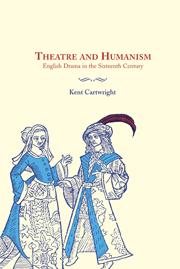Book contents
- Frontmatter
- Contents
- Acknowledgments
- Introduction
- 1 The humanism of acting: John Heywood's The Foure PP
- 2 Wit and Science and the dramaturgy of learning
- 3 Playing against type: Gammer Gurton's Needle
- 4 Time, tyranny, and suspense in political drama of the 1560s
- 5 Humanism and the dramatizing of women
- 6 The confusions of Gallathea: John Lyly as popular dramatist
- 7 Bearing witness to Tamburlaine, Part 1
- 8 Robert Green's Friar Bacon and Friar Bungay: the commonwealth of the present moment
- Afterword
- Notes
- Index
6 - The confusions of Gallathea: John Lyly as popular dramatist
Published online by Cambridge University Press: 22 September 2009
- Frontmatter
- Contents
- Acknowledgments
- Introduction
- 1 The humanism of acting: John Heywood's The Foure PP
- 2 Wit and Science and the dramaturgy of learning
- 3 Playing against type: Gammer Gurton's Needle
- 4 Time, tyranny, and suspense in political drama of the 1560s
- 5 Humanism and the dramatizing of women
- 6 The confusions of Gallathea: John Lyly as popular dramatist
- 7 Bearing witness to Tamburlaine, Part 1
- 8 Robert Green's Friar Bacon and Friar Bungay: the commonwealth of the present moment
- Afterword
- Notes
- Index
Summary
The dramaturgy of women that we have been considering brings us to the plays of John Lyly, who invests romance with a new, sophisticated dynamism. We have learned to think of Lyly as the archetype of the failed “humanist as courtier.” In that melancholy conception, the humanist endeavors to put his high ideals and intellectual skills to work for the court, only to discover that it values him solely as an entertainer. We can consider Lyly, however, from another, less familiar angle, that of the humanist as “popular playwright” who adds to the emotional power of public theatre. To do so calls into question once more the prevailing paradigm of sixteenth-century drama: that humanist plays differ from popular ones in that the former are intellectual, arid, and aristocratic while the latter are visceral, imaginatively arousing, and plebeian, and that consequently playwrights such as Lyly failed with the public because they wrote a static “drama of ideas.” Reappraisal of that reigning paradigm of Tudor drama involves recognizing a virtue in humanist plays exactly where they presumably fall short of popular ones, in the aspect of theatricality.
Toward that end, I offer two arguments about Lyly's drama, using the “court comedy” Gallathea (c. 1584) as my leading example. First, although Lyly's plays have been treated by modern critics as static and intellectual dramas of ideas, Gallathea generates emotional and visceral delight from, not exactly ideas, but a pleasurable “confusion” that displays theatrical values one expects from popular plays.
- Type
- Chapter
- Information
- Theatre and HumanismEnglish Drama in the Sixteenth Century, pp. 167 - 193Publisher: Cambridge University PressPrint publication year: 1999



